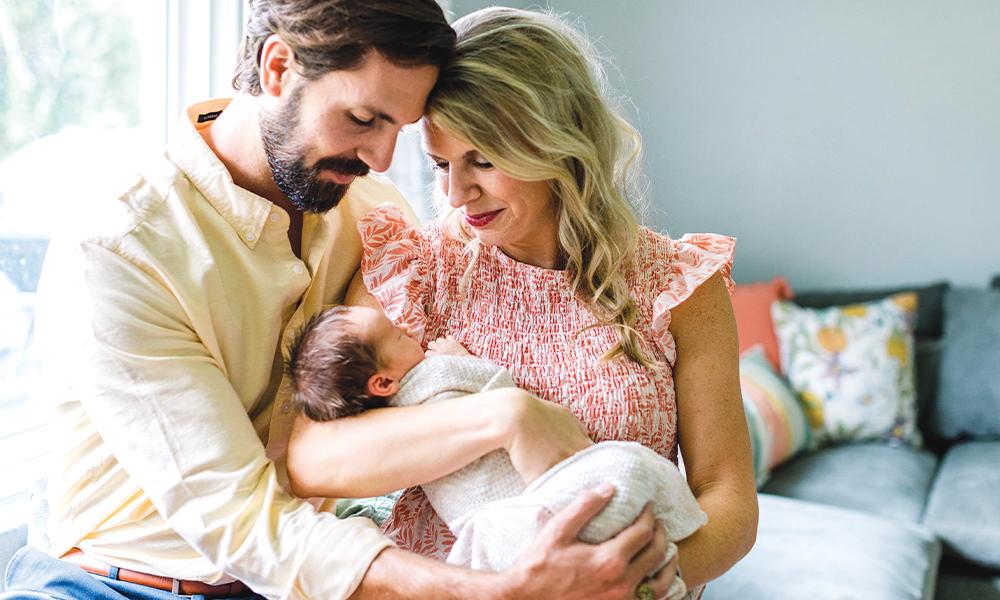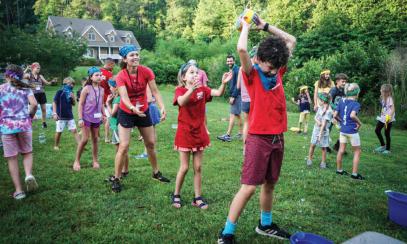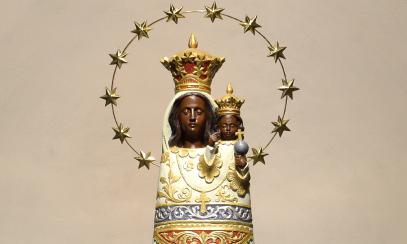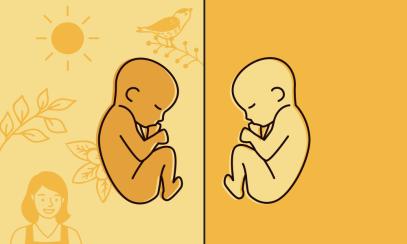
FertilityCare Week: Addressing the Heartbreak of Infertility as Catholics
For Worldwide FertilityCare Week, which is March 19-25 this year, we interviewed Kate and Chad Smith, who live in Charleston. Kate is a certified registered nurse anesthetist and Chad is a civil engineer. They lovingly shared their struggles and how the Creighton Model System (CrMs) and Natural Procreative Technology (NaProTechnology) helped them move from infertility to parenthood.
For Worldwide FertilityCare Week, which is March 19-25 this year, we interviewed Kate and Chad Smith, who live in Charleston. Kate is a certified registered nurse anesthetist and Chad is a civil engineer. They lovingly shared their struggles and how the Creighton Model System (CrMs) and Natural Procreative Technology (NaProTechnology) helped them move from infertility to parenthood.
How did you first hear about CrMS FertilityCare?
Kate: Chad and I were married in June 2018. Like other engaged couples at St. Patrick, we were required to attend a Marriage Preparation Class at the Chancery [the diocesan Pastoral Center]. It was there that I first heard a formal presentation on NFP and decided to follow up with instructions to learn the CrMS. I immediately started charting.
Was Natural Family Planning hard to use?
Kate: Creighton strengthens our marriage because the process takes both of us. The method keeps everything in proper balance. I appreciated my husband’s humor when charting. It really helped when I would get discouraged. I am also thankful for Creighton and NaProTechnology, that there is a way to look at your natural cycle and find the underlying concerns so that medical issues are not swept under the rug but treated.
Chad: Kate would write down the observations each month. It is a doable method whether you are trying to achieve pregnancy or avoid it. It is not overbearing, and it was a huge help for us in determining when ovulation was occurring. It is also something that brought us closer together.
When did you first realize you might have a problem getting pregnant?
Kate: When we decided to start trying to conceive, I went to a Creighton system OB/GYN, Dr. Nancy Stroud. She looked at my charts and detected a couple of issues. After various blood draws, tests and medications to help us achieve pregnancy, I still was unable to get pregnant. Dr. Stroud said that she had exhausted all that she could do. At this point, I was having to decide whether to go to a fertility center or find another way. It didn’t seem to make sense that we should have problems getting pregnant; Chad and I were healthy. There was no history of infertility in either of our families.
I had a best friend in Illinois who struggled to get pregnant — now the mother of two healthy boys — [and was] under the care of Dr. Jillian Stalling, NaProTechnology OB/GYN, who practices in Fort Wayne, Indiana. I decided to give Dr. Stalling a call, and she was available for a telehealth appointment. The questions that she asked were very in depth. I remember thinking that she was serious about finding out what was the problem.
I had already tried all the standard medications, diagnostic tests and labs. Everything came back normal, so after over a year of trying to conceive, I decided to go with the recommended exploratory surgery. Chad and I flew to Indiana, and Dr. Stalling discovered deep endometriosis [when cells that normally line the uterus grow outside it] requiring a robotic excision. The endometriosis was “silent” in that my only real detectable symptom was infertility.
Why did you decide not to go to a fertility center?
Kate: We both wanted a family very badly. I also wanted to know why I was unable to achieve a pregnancy. Again, I go back to both my husband and I being healthy and how it did not seem to make sense that we were having these issues. A piece from the puzzle was missing. I was attracted to the CrMS and NaProTechnology working with my natural cycle to diagnose issues and help me get pregnant.
I was fortunate that my friend shared her experience with Dr. Stalling. There are so many Catholics who don’t realize how beneficial the Creighton Model is to help a couple achieve pregnancy. My friend had heard about it from our hometown parish priest. They both encouraged me to look into using my CrMS charting to seek care from a NaProTechnology doctor.
Many describe their infertility journey as an emotional rollercoaster. What was it like for you?
Kate: The first six months I was still hopeful each cycle, but after a year of trying and tracking, I was getting tired. Taking a pregnancy test was tough emotionally because I would get my hopes up. Even though my brain was saying I wasn’t pregnant, my heart was saying maybe yes. After about a year of trying to conceive, I would cry the first day of each cycle and try to give myself time and space to grieve, and then move on and prepare for this new cycle.
I remember asking why it had to be us to endure this tough and unsure road to parenthood. For me, it was the unknown if achieving pregnancy was possible — the lack of guarantee. I remember struggling and getting angry with God, which ultimately led me to [go to] confession … [after] my visit to the Shrine of Our Lady of La Leche.
Tell us about your visit to the shrine.
Kate: We go to Jacksonville, Florida, to visit Chad’s family each year for Thanksgiving. We decided to visit the Shrine of Our Lady of La Leche in St. Augustine. I entered knowing that I would cry, and I did. I tried to leave all my pain and emotion there. After the surgery I knew I was “fixed,” and I expected to be pregnant instantly. I cried because I had not gotten pregnant yet and was losing hope. I begged Mary to help us. I also asked my dad, who had passed, to help too.
A week later is when I went to confession. It turns out I went to a priest who was very familiar with the Creighton Method and the emotional difficulties that come with infertility. I remember when I told him I was angry with God. He said it was not an authentic relationship if you don’t get hurt feelings. One person gets focused on their story and forgets the other. That confession really helped.
He also asked about my marriage. Chad and I had been through my dad’s passing, and my husband continues to help me with my grief from [my father’s] death. The trials seemed to make our marriage stronger. Chad even consulted my best friend who experienced infertility to find out what he could do to help me. He is constantly trying to learn what he can do to help, and I am so grateful for him.
How long after the endometriosis removal did it take for you to get pregnant?
Kate: It was not instant and that was tough for me. Three months after the surgery and after over two years of trying to conceive, I was pregnant. Looking back now, I realize three months from surgery to conception is a short and impressive window, however, when you are still in your fertility journey and questioning if achieving a pregnancy is even possible, each month feels just short of an eternity.
When did you find out you were pregnant, what happened?
Kate: I took the pregnancy test at the end of the month. I had gotten so good with charting that I knew that my period was three hours late, and I decided to take a test. I used an old pregnancy test and saw a faint line that indicated pregnancy. I called my husband, and we ran to the store to buy a pregnancy test that would actually say the word “pregnant.”
I took the test and walked out of the room, as I always did in the past, and would not look at the test again until the time required had passed for results to appear.
Chad: She had taken the first one, but I thought it was a Covid test! We went to Harris Teeter and got another pregnancy test. After she took it she put it down, and I couldn’t wait and went into the room to take a peek. I told her that it was positive.
Kate: Chad snuck into the bathroom and said it was positive, and I screamed.
Chad: Seeing the results made me happy and nervous. I was nervous because I did not want to get our hopes up too high. I wanted to hear the heartbeat, and even then I was excited but still cautious.
Kate: I called Dr. Stroud’s office, and we did an ultrasound to confirm. I cried the happiest tears of my life when I heard the heartbeat of our little girl. We now have our Mary Olivia, who we call Olivia. She came three weeks early, but everything went well.
When my dad passed away, I prayed the Memorare every day to ask Mary to help me manage my grief, and sometimes I just needed strength to get through the day. I also prayed every day to get pregnant, and then for a safe pregnancy and birth. I continue to pray the Memorare, and I am so thankful for Mary’s intercession. That is why our baby’s name is Mary Olivia.
What advice would you give someone who is struggling with infertility?
Kate: I can only share what worked for me because everyone is different. I remember how isolating fertility issues can feel, so for me I found it very cathartic to share our story with friends and family.
The things asked of you might sound too hard to do at first. Just start with charting. The charts provide so much information that are helpful to you and your doctors. Try to be patient with yourself and the doctors.
I also had to learn to cut myself some slack now and again — I often felt guilt when I was given exciting news that someone close to me was pregnant; I felt excited for them but sad for Chad and I. Be kind to yourself during this difficult time.
Chad: As the husband, be strong. Make sure your wife knows that you are unified in wanting a child. When you are a team, if one is down the other lifts them up. Sometimes it is best not to say things like “it’s going to be okay.” Instead, acknowledge how it feels.
What helped most when you were down?
Kate: I am so grateful for my husband, who was engaged [in the process], and my family and friends that supported me when I was struggling. I am thankful for God who forgave me and always loves me. I would also ask Mary for help, and to intercede for us — being a mother and because of her humanity, I felt more in touch with her. I also felt she was helping me the whole time.
Chad: I believed the right thing was going to happen at the right time. It was important for us to be there for each other. On the tough days, I learned to listen, not saying anything but just hugging her. We were going through it together, and that really helped.
How did you feel when you first got to hold Olivia?
Chad: I was thinking that I better not drop her. She was the first baby I ever held. I couldn’t believe it. I was a dad.
Kathy Schmugge is the senior director of Social Ministries and director of the Office of Family Life. Email her at familylife@charlestondiocese.org.



